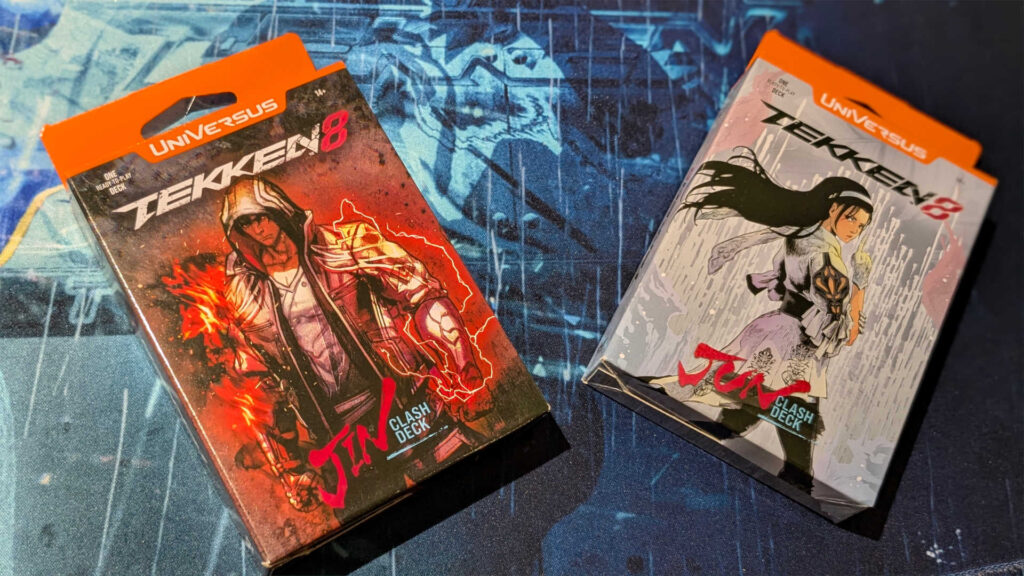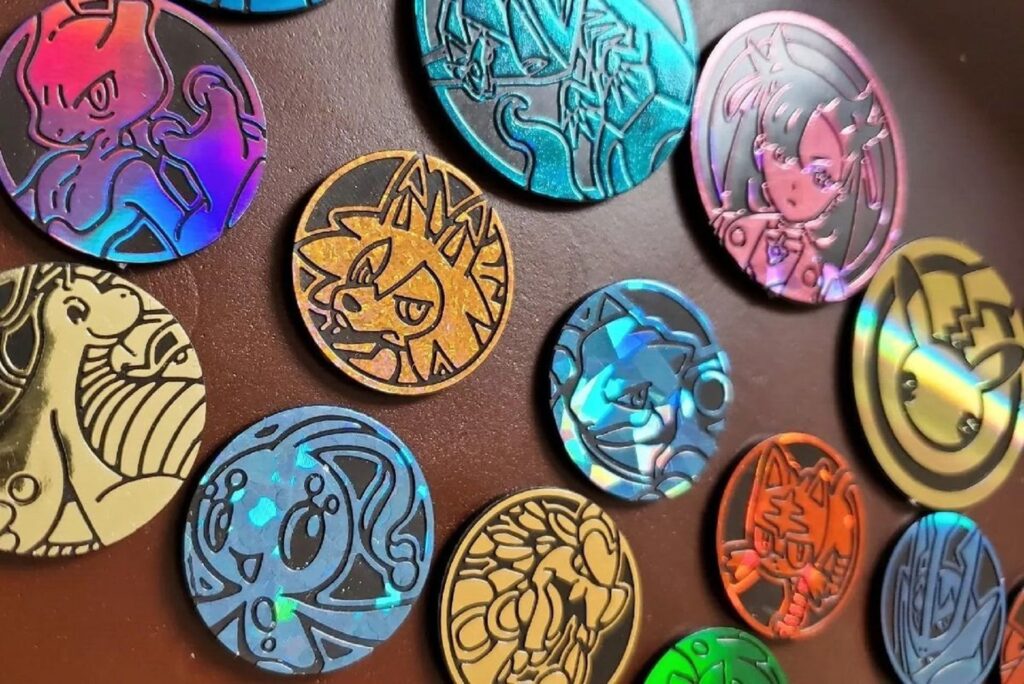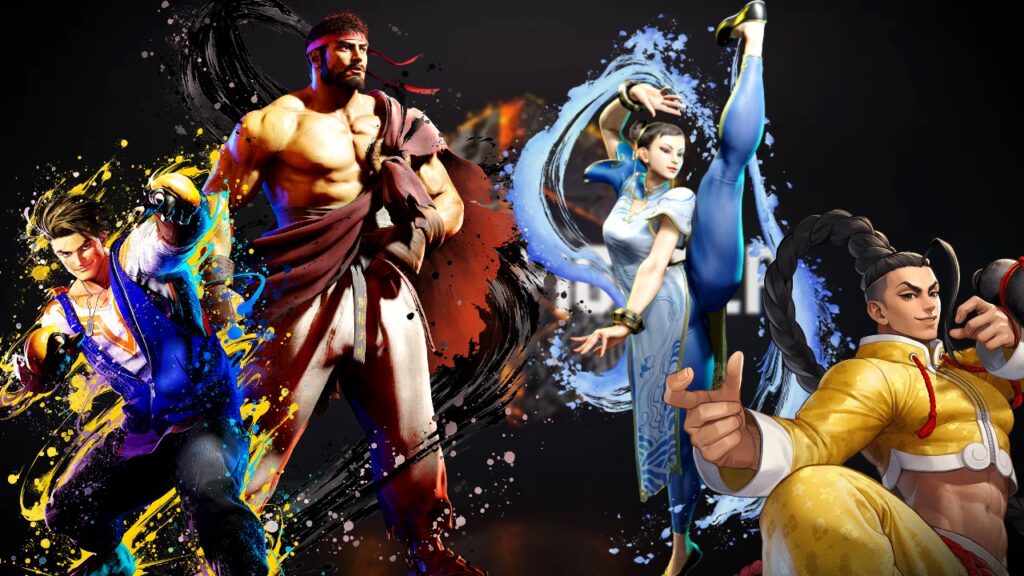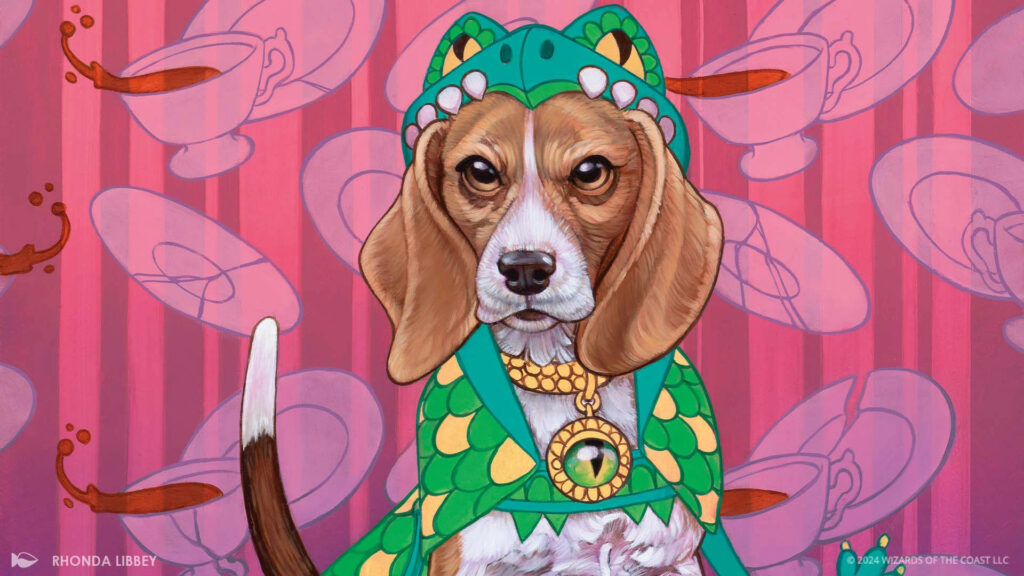One of my favorite video game series ever, Street Fighter, has been adapted into tabletop form numerous times; I recently checked out the sadly out-of-print Street Fighter Deck-Building Game, and found it to be an incredibly addictive experience, perfect for fans of the franchise regardless of their age or experience level. Street Fighter was, prior to the Deck-Building Game, perhaps most successfully adapted in the fighting-based collectible card game (or CCG), the Universal Fighting System (or UFS), which in more recent years has been renamed and relaunched as UniVersus. Another of the greatest fighting game franchises, and one of Street Fighter‘s biggest arcade and home console rivals, Tekken, has now made its way to UniVersus. Two Tekken 8 Clash Decks are now available, so let’s check them out and see if they’re the perfect entry point for Tekken fans, or any fighting game fans, to the long-running UniVersus CCG!
Table of Contents
ToggleGetting Started With UniVersus
UniVersus publisher, UVS Games, has released two Clash Decks featuring characters from the most recently released game in the Tekken series, Tekken 8. One features Jin Kazama, who, since his introduction in Tekken 3 (way back in 1997), has become the de facto main character of the series. The other deck centers around his mother, Jun Kazama, who makes her first main series appearance in Tekken 8 since her last appearance in 1996’s Tekken 2. Given her youthful looks, you’d be forgiven for thinking that Jin and Jun are siblings, but that’s not the case!
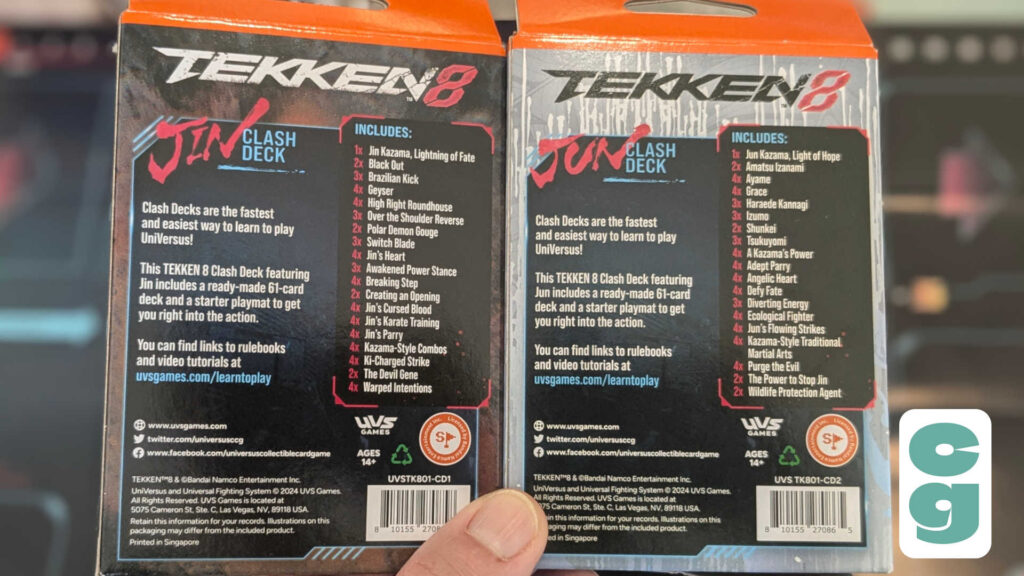
The UniVersus range features pre-constructed Clash Decks, Challenger Series decks, and booster packs. The best entry point for new players are Clash Decks, with the Challenger Series products and boosters being aimed at more experienced UniVersus fans.
The Tekken 8 Clash Decks each feature 61 cards (that’s 60 cards that comprise a pre-constructed deck, plus one character card) and a paper Tekken 8 playmat. As the Clash Decks are aimed at beginners, it’s a huge disappointment to find that there are no rules included in the box, and instead a flyer with a QR code is included to direct players to online rules. Even more disappointing is the fact that this doesn’t lead to any official rules document, instead taking players to a Tolarian Community College video which teaches players “how to play [the] My Hero Academia UniVersus CCG in 15 minutes (or less).” We have nothing against the Professor or his teaching methods (he does do a great job of covering the basics), but this is simply not good enough as a way to learn the game’s rules in a practical, ongoing way.
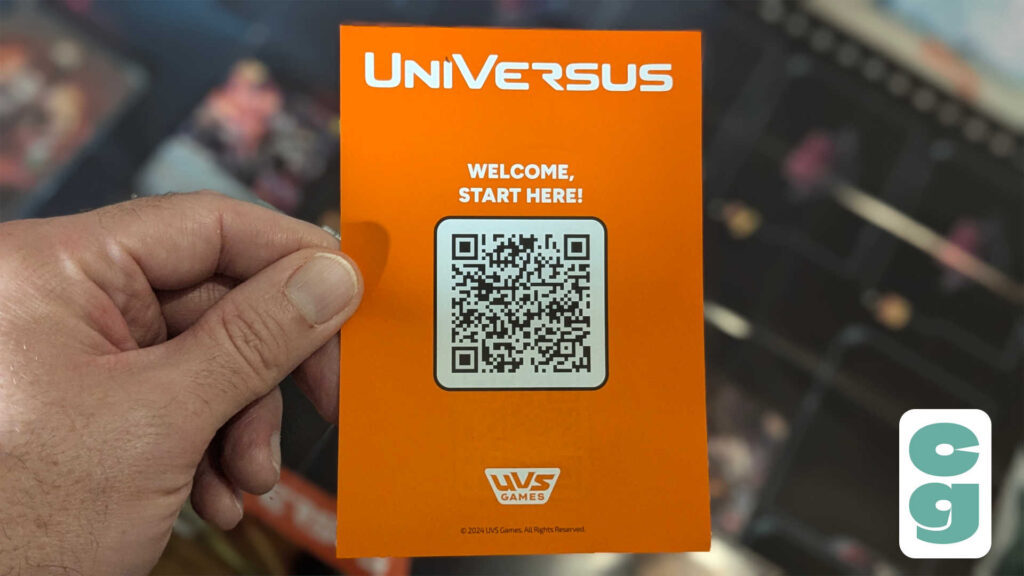
Firstly, it’s likely to confuse new players just with the name, given that it states it’s the My Hero Academia UniVersus CCG in the title. Secondly, the cards themselves have undergone a redesign since the video was made; both the card backs and fronts have been changed in various ways, making it much more difficult to use this video to get to grips with UniVersus. Perhaps the most egregious problem that makes it so much harder to learn how to play, however, is the fact that there’s no clear turn phase or comprehensive play order given to players, either in the box or in the video itself. Though phases are helpfully broken down and explained by the Professor, during play a turn order reference is desperately needed.
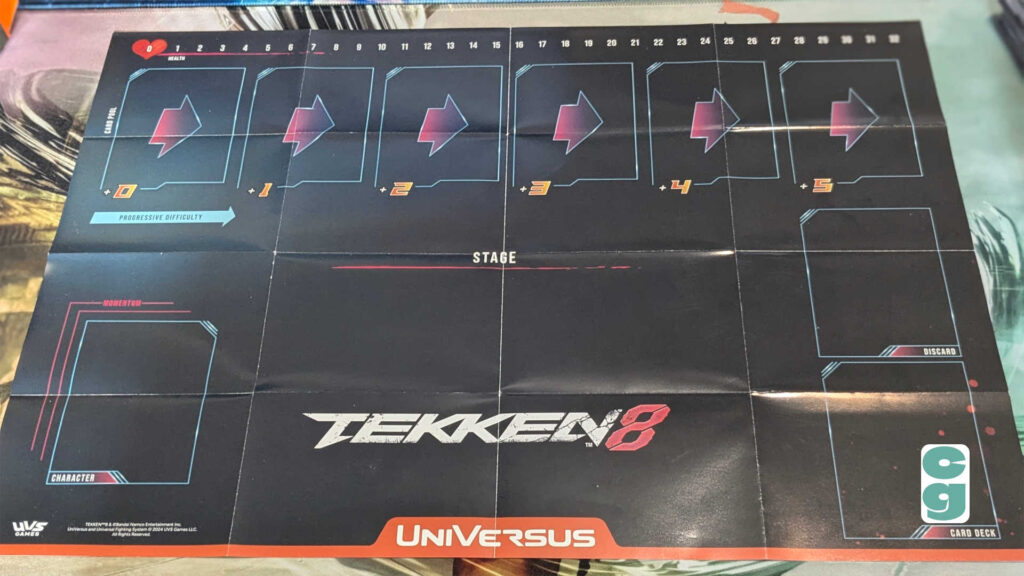
Of course, that wouldn’t be an issue if the turn order or quick summary of the game’s phases was included in the box, or even on the playmat (games such as Star Wars Unlimited and Disney Lorcana, to name two examples, do a wonderful job of ensuring this information is available at a glance to aid players), but the playmats don’t feature any of those details at all.
It’s a big stumbling block, and UniVersus isn’t the easiest game to learn, even with all of that information easily to hand. If you’re just getting into the game yourself, rather than relying on the Tolarian Community College video (which won’t help you with questions that can and will arise during your first few games), we’d suggest checking out the How to Play page of the official UniVersus website (which is recommended in fairly small print on the back of each box), and download the official rules document. That way you have something you can open and refer to when necessary during play. It’s also a really good idea to have someone actually teach you to play, so they can answer any questions that arise there and then; you can find stores near to you by using the official UniVersus store locator, and you should be able to find someone who can assist you locally, in person.
How to Play UniVersus
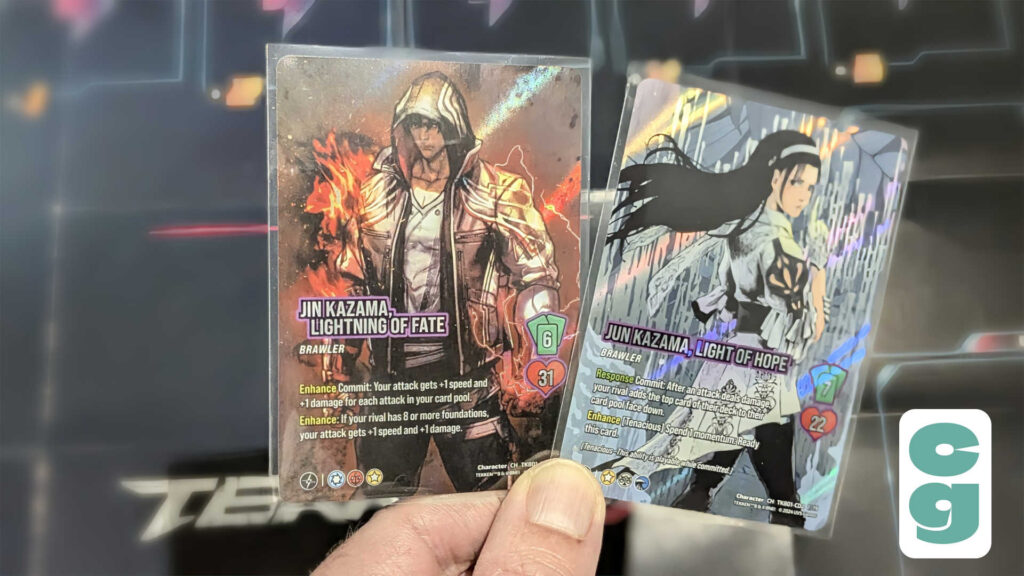
With all that in mind, let’s check out how you play UniVersus. Each player has a character card, which they place in their play area when the game begins. The character card determines a player’s hand size throughout the game, as well as their health total; in the image above, you can see that Jin has a hand size of 6, and health of 31, whereas Jun has a hand size of 7 and 22 health. Characters also give players special abilities during the game, and the character’s resource symbols (found in the bottom left of the card) also determine which cards you can have in your deck. The last point is, of course, something you won’t need to think about when using a pre-constructed deck.
Each turn, players will play cards from their hand to their card pool. Each time a card is played, they must make a skill check, comparing the card’s difficulty number in the top left with the check value (found in the bottom right) of the card they’ll turn over from the top of their deck. If the card they turn over has a value the same or higher than the card the player is attempting to play, the check is passed and the card used for the check is discarded. If they fail, the active player has the opportunity to commit (or turn sideways, such as tapping in Magic: The Gathering, exerting in Disney Lorcana or exhausting in Star Wars Unlimited) foundation cards that they have in their stage area; each card committed in this way adds a point to the skill check.
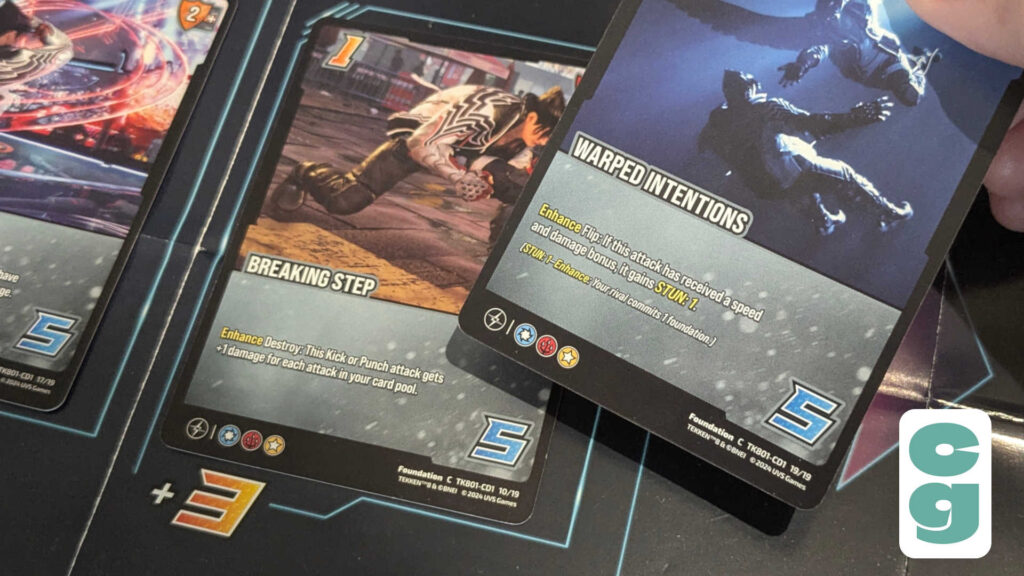
Further cards can be played, but the difficulty increases by one point for each successive card played. For example, if one card is already played in the card pool, the next card will need to +1 to its skill check. After that, it’s +2 and so on. For example, if Jin’s player wants to play Breaking Step, its cost is one, as you can see on the top left of the card in the above image. However, as the fourth card to be played that turn, the difficulty is increased by three; therefore, the skill check will be four. They turn over the top card of their deck and reveal Warped Intentions, which has a check value of 5 as you can see once more in the above image. This means that they check is passed, Breaking Step is played, and Warped Intentions is discarded.
If a foundation card is played to the card pool, play continues until the player doesn’t want to play any more cards there. If an attack is successfully played, the attack phase begins, which is the real focus of the game.
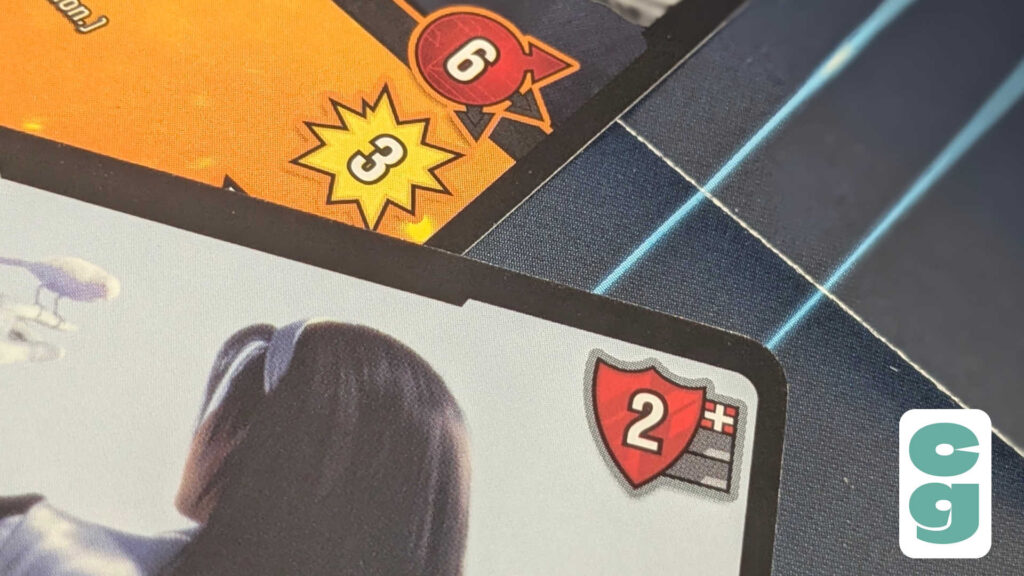
Attacks hit in one of three zones: high, mid, or low. The defending player may block using a card from their hand; to block, the blocking card must have a block symbol in the same or an adjacent zone to the attack (so a high attack can be blocked by a high or a mid block, but not a low block). They then add the speed of the attack to their block value, and must pass a skill check (using the same method as when attempting to play a card). In the above example, the Jin player’s attack has 6 speed and attacks in the high zone; it has three points of damage if it hits. The block card from Jun blocks in the high zone, so if successful would block all three points of damage. The skill check to pass this would be the attack’s speed (6) plus the block value (2), meaning that this has a difficulty to 8 (+1 for each card already in the card pool).
If they fail, the attack deals its full damage (that’d be three points of damage, using the above example once more) to the defender’s health; if they pass, the attack deals no damage if the block matches the same zone as the attack, but half damage if the block was in an adjacent zone (rounded up; in the above image, half damage dealt would be two points of health).
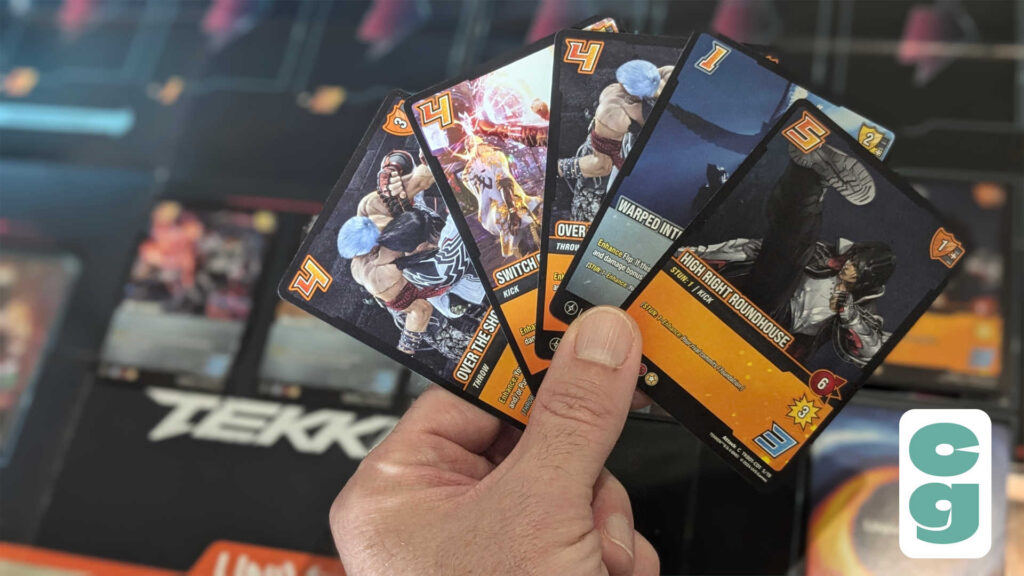
Players can continue playing cards until a check fails, or simply pass to their opponent when they’re ready. It’s useful to keep a certain number of cards in hand to defend against attacks, especially as you may be trying to defend yourself from multiple attacks per turn.
Once a player plays all the cards they want or fails a check, foundation cards move from the card pool to the player’s stage, where they remain. Other card types, such as actions, are usually used and immediately discarded, but assets move to the stage just like foundations; however, they can’t be used to commit when making skill checks. There are also various special abilities on foundation cards that can be used at different times; sometimes these trigger when certain events take place, or during battle; characters also usually have several abilities that can be used at different points of the game, in various ways. Successful attack cards can be moved under the player’s character, and used to pay the momentum cost of certain card abilities in future turns.
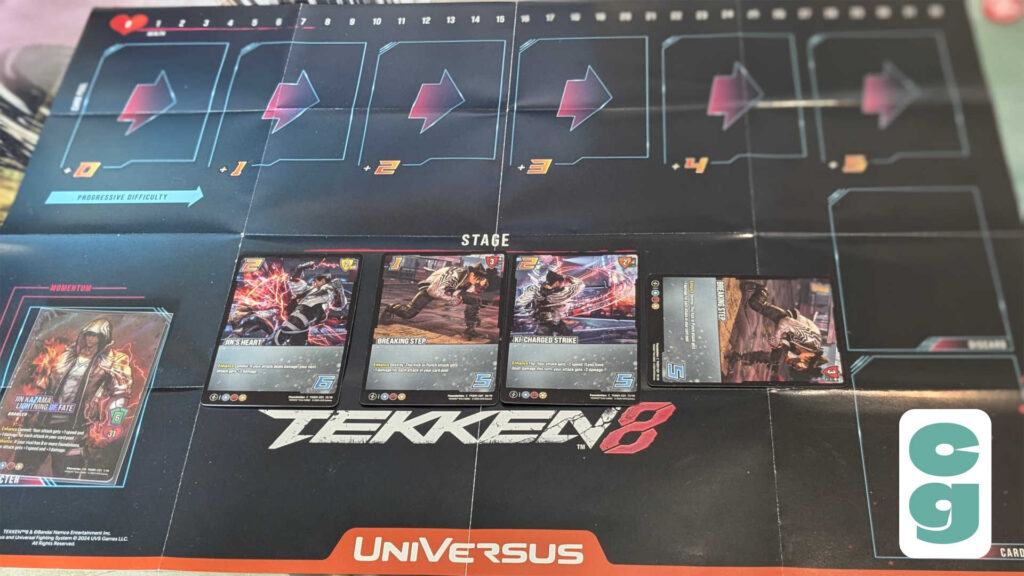
Play then passes to the other player, and rounds continue in this way until one character’s health is reduced to zero; the last player standing is the winner!
The UniVersus Tekken 8 Clash Decks
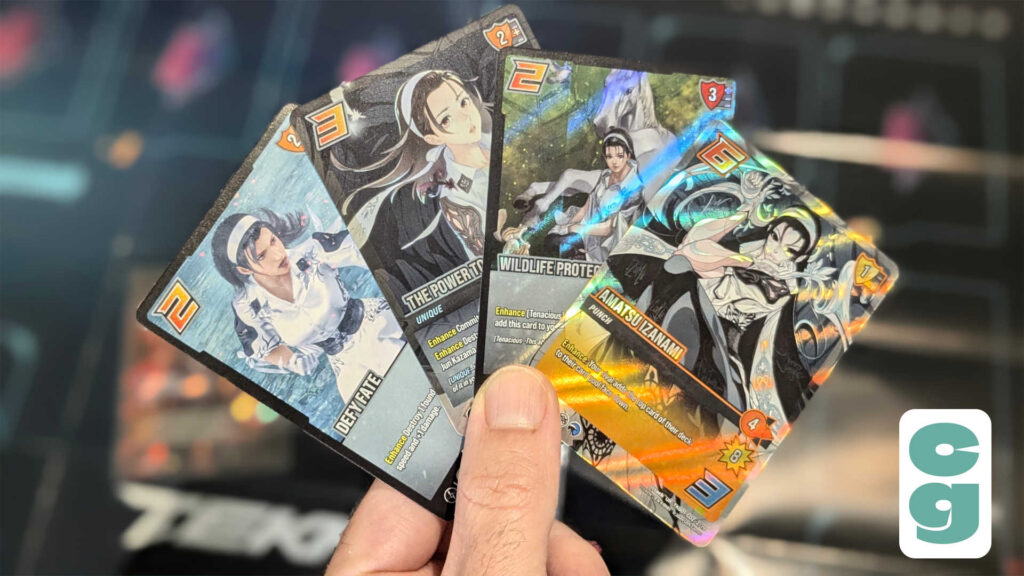
If you’re a fan of Tekken, you’re likely going to be really impressed with the quality and design of the Tekken 8 Clash Decks, which use a combination of excellent illustrations and, admittedly often not particularly aesthetically pleasing, mid-fight screenshots from the video game on the cards. The foil cards, however, all look absolutely beautiful and are very impressive, quality-wise; along with the surge foil-style character card, numerous cards from each deck have the same treatment.
The decks feature attacks and characteristics which are thematic and faithful to the attack moves and traits of each character in Tekken lore; for example, Jun’s status as a Wildlife Protection Agent, and her general affinity with the animal kingdom, is referenced on several cards, as are many of her fighting moves. Jin’s deck is, of course, similarly thematically appropriate to his character.
Despite the issues with the lack of rules guidance or player aids in the box (or even a counter to track health), these decks are undoubtedly the best way into UniVersus for new players; of course, if you’re not au fait with Tekken itself, or the theme doesn’t interest you at all, other Clash Decks are available.
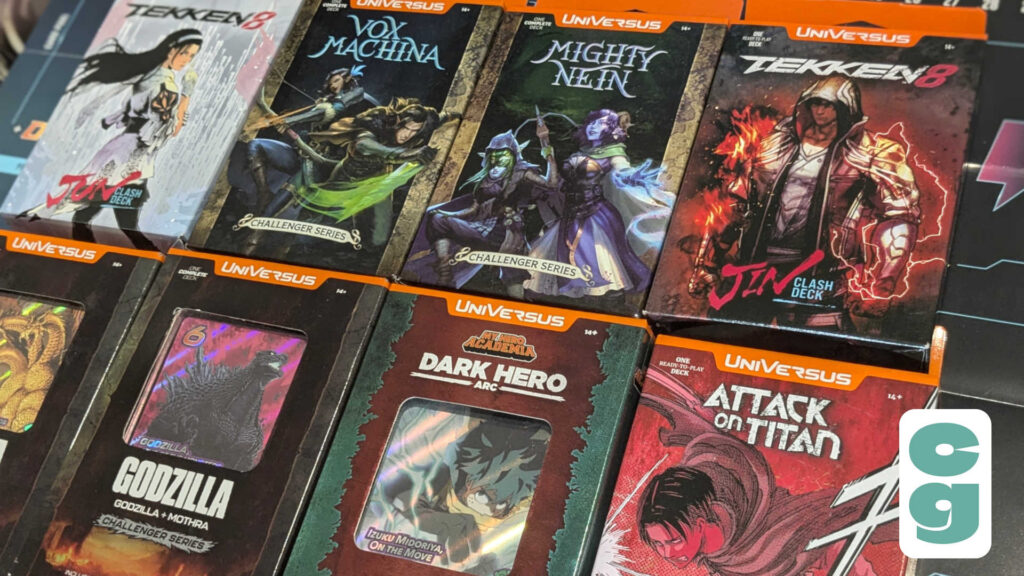
One of the biggest selling points for UniVersus is that all of its sets, regardless of the source material they’re based on or when they were published, are cross compatible, so the Tekken cards can be used with Attack On Titan, My Hero Academia, Star Trek, Godzilla, and Critical Role cards, as well as numerous others. So even if Tekken isn’t necessarily of interest, you can use these decks as a springboard to launch you into the wider UniVersus experience, and then mix and match your cards as much as the deck building rules allow. Even cards which look slightly different on the front (having been redesigned numerous times over the years), or with different card backs, can be used together, though of course with different card backs, opaque card sleeves must be used so players can’t identify cards coming up next.
Is UniVersus Fun to Play?
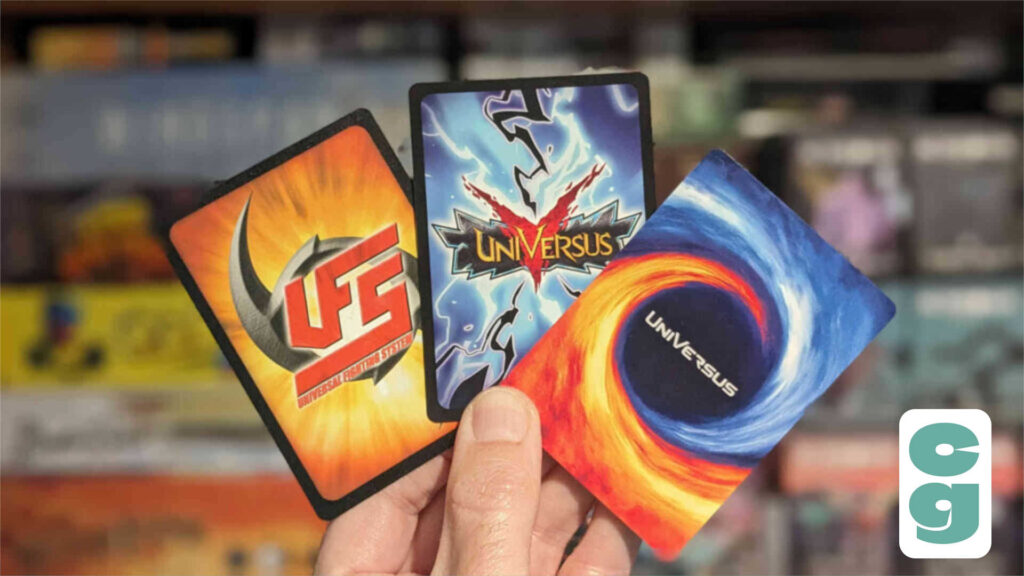
Given that UniVersus has been around since 2006 (albeit evolving with a name change and several card redesigns), you’d expect it to have some appeal, and the answer here is that yes, UniVersus is a really solid game.
It is, however, a game that bears some hallmarks of its age, with some really complicated card play and timings that make it very difficult to learn, even with the benefit of having the official learn-to-play guide in hand. Publisher UVS Games don’t make it easy to pick up and play either, with the lack of rules or a summary with Clash Decks, despite the fact that these are positioned as the entry level products for the game.
Newcomers to CCGs in general are likely to find themselves overwhelmed by the game’s rules and even the multiple uses of each card, such as attacking, blocking, and skill checks. Though clever, versatile, and flexible, the UniVersus system in general is tough to get into, even for non-newcomers to CCGs.
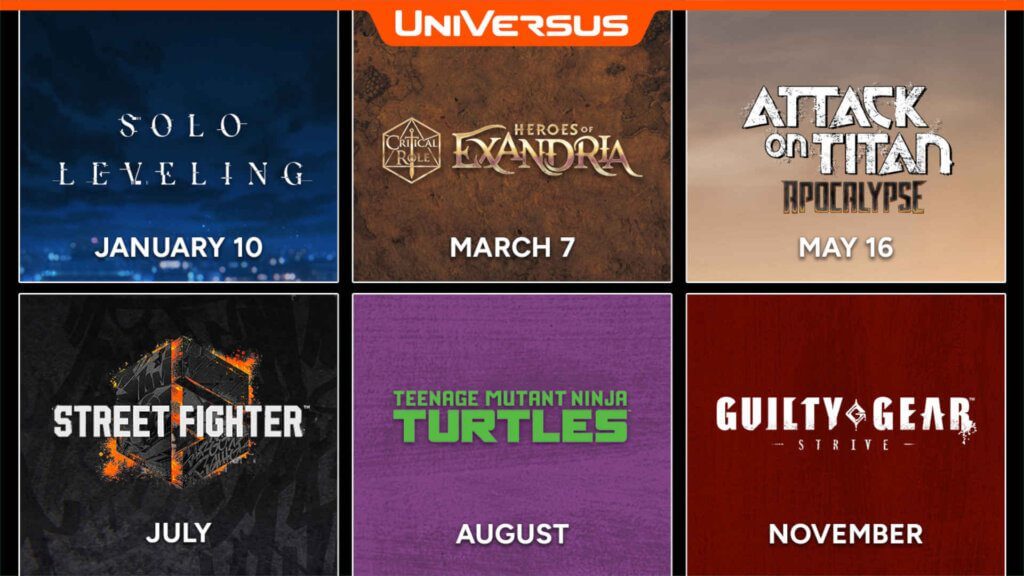
As the game’s longevity goes some way to proving, however, playing UniVersus is an excellent experience, at least once you’ve managed to get over the steep, overwhelming learning curve that it initially presents. With new, and returning, franchises being adapted to UniVersus in 2025, such as Street Fighter and Teenage Mutant Ninja Turtles, not to mention the ongoing My Hero Academia and Attack On Titan sets, it’s a great time to jump on board.
The Card Gamer Verdict
UniVersus is a long-running game for a reason, but the fact remains that it’s a very difficult game to get started with. These Tekken 8 Clash Decks, despite being perhaps the easiest way to begin playing UniVersus, suffer from a lack of rules or assistance for new players, and there’s still a steep learning curve to overcome before players get accustomed to its unique, fighting game style.
However, UniVersus does reward persistence, and players who overcome the initial hurdles will discover a rich, diverse, and ever expanding card game that covers a massive variety of pop culture franchises with huge crossover appeal.
UniVersus is a CCG that many players may have never heard of, but its longevity and versatility make it a game that’s worth getting to grips with. That’s especially true here for fans of the Tekken series, who will find a lot of excellent fan service in these Clash Decks.
This article may contain affiliate links. If you use these links to purchase an item we may earn a commission. Thank you for your support.

